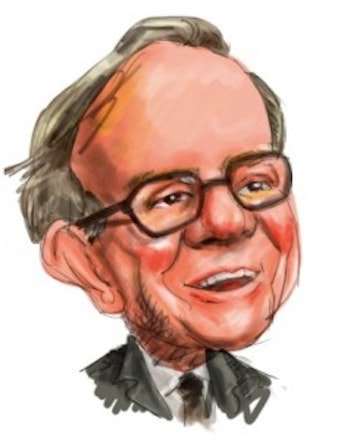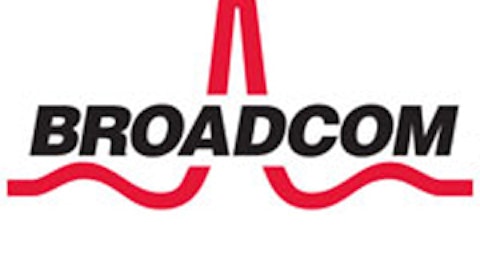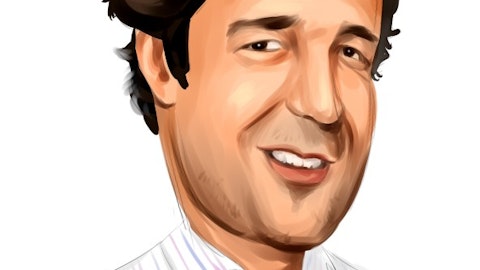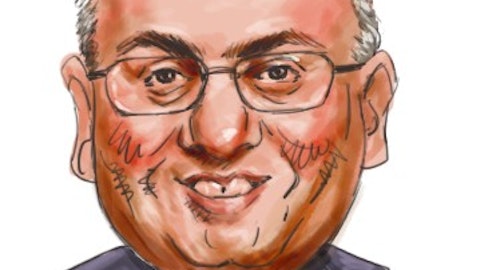When most investors hear Berkshire Hathaway Inc. (NYSE:BRK.A) (NYSE:BRK.B), they think of Warren Buffett (see Buffett’s favorite stock picks), and rightfully so, but it’s important to note that the company has interest from other major players in the hedge fund industry as well. According to our records, 52 of the 400+ hedgies we track hold long positions in Berkshire’s class A and B shares, including Ravenel Boykin Curry III’s Eagle Capital Management, Charles de Vaulx’s International Value Advisors and Crispin Odey’s Odey Asset Management (see all of Crispin Odey’s stock picks).
In fact, in the latest round of 13F filings from the SEC, we found that Berkshire Hathaway’s B shares saw some extremely bullish activity from Ken Fisher (+20,571%), Whitney Tilson (+1,790%) and Israel Englander (+507%), each upping their stakes considerably from one quarter earlier (see all of the hedge fund interest in Berkshire Hathaway).
The logical question that must be asked is: should individual investors monkey these big-timers into Berkshire Hathaway?
Due to the impracticality of owning Berkshire’s Class A shares, which currently trade in the neighborhood of $142,300 a piece, we’ll focus on the Class B shares in our analysis. This class of shares trade at roughly 1/1,500th the value of its more expensive counterpart, and were originally created to prevent investors from turning to unit trusts. Over the past decade, shares of Berkshire’s Class B shares have returned 102.5%, and Berkshire’s Class A shares have returned 101.8%, so the appreciation has been nearly identical.

One particular Buffett-esque ratio we can use is earnings yield, which simply indicates a company’s earnings as a percentage yield of its price. At current prices, the earnings yield of Berkshire’s B shares is 6.0%, far above the yield of a 10-year Treasury (1.9%), which is the common yardstick employed by the Oracle himself. More importantly, this earnings yield is higher than the 5.7% yield that shares have averaged over the past decade. Interestingly, Berkshire’s Class A stock sport an earnings yield near 5.7% as well, indicating that its cheaper counterpart may in fact be the better buy at the moment.
So what about the specific companies within Berkshire’s actual portfolio?
Well, thankfully, we can see these holdings due to its quarterly 13F filings with the SEC (see Berkshire’s total portfolio here), which show us that a little under 60% of its total 13F assets are invested in three companies: The Coca-Cola Company (NYSE:KO), Wells Fargo & Company (NYSE:WFC) and International Business Machines Corp. (NYSE:IBM).
Each investment currently sports an earnings yield more than twice that of a Treasury Bond–Coca-Cola is at 5.2%, Wells Fargo is at 9.5% and IBM is at 7.1%. Equally as crucial, each company is a behemoth in its respective industry. In the hedge fund industry at large, this trio is also extremely well-loved. Each was in the 98th percentile in our entire universe of stocks, with Wells Fargo (81) having the highest level of fund interest.
The sell-side expects each company to experience annual earnings growth between 7-9% over the next half-decade, and only IBM pays a dividend below a 2% yield. In terms of valuation, Coca-Cola, Wells Fargo and IBM all trade at a discount in relation to their respective industry averages, and Wall Street’s price targets expect an upside of 10-14% from current levels for each stock.
While it’s tempting to just take a look at the value of Berkshire Hathaway itself, investors must realize that the majority of the firm’s portfolio also offers solid value, and some of the smart money’s biggest players have been bullish. While an 82-year old Warren Buffett may scare some investors, it’s important to mention that the Oracle is still in relatively good health after receiving treatment for stage 1 prostate cancer last year.
For the time being, we’d still place a “Buffett premium” on the stock that’s surprisingly trading at a discount. To read more related coverage, continue on Insider Monkey below:
Bill Gates Still Loves Berkshire
Warren Buffett News: Don’t Invest in ‘Stuff’
Disclosure: I don’t have any positions in the stocks mentioned above





